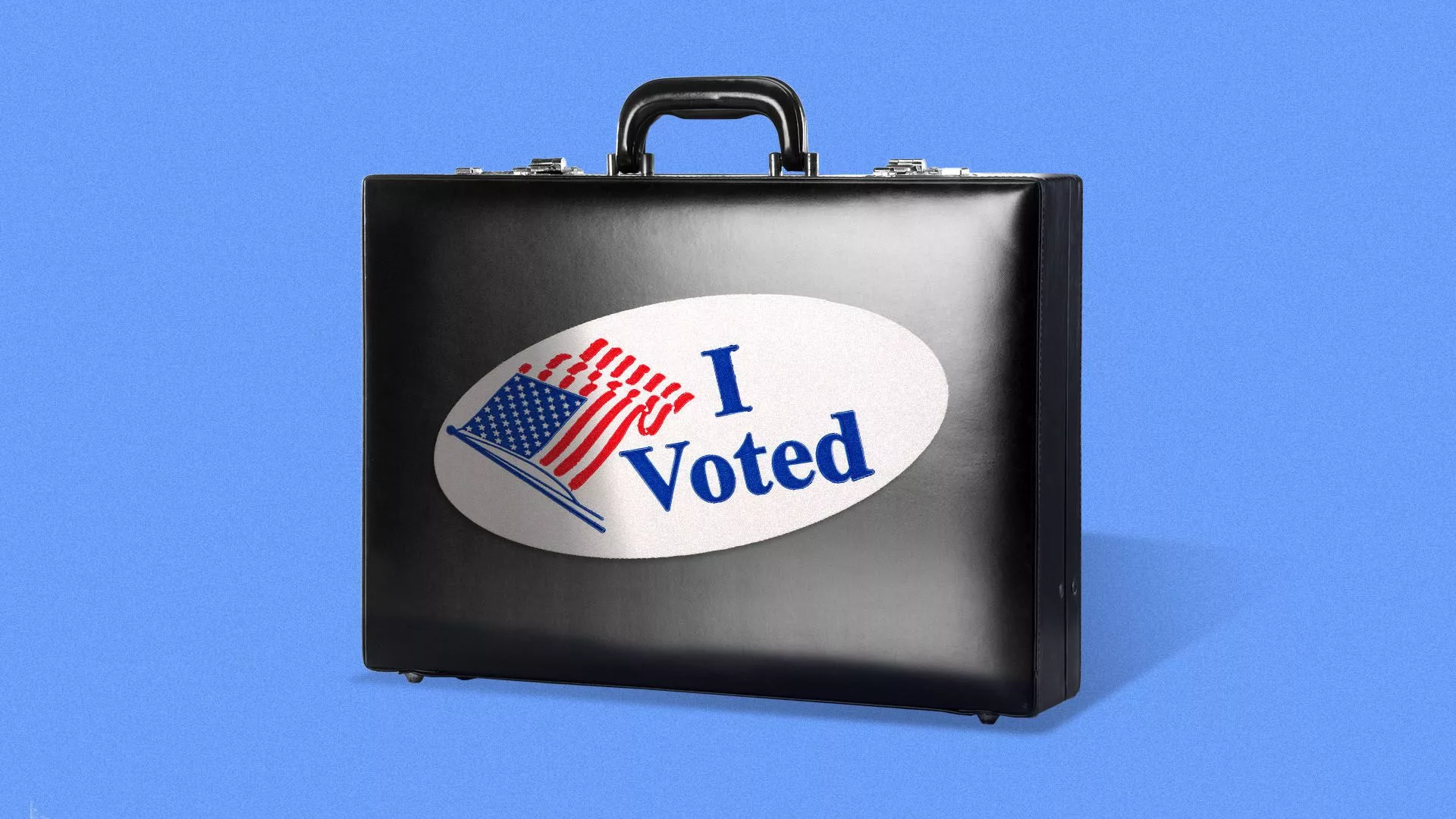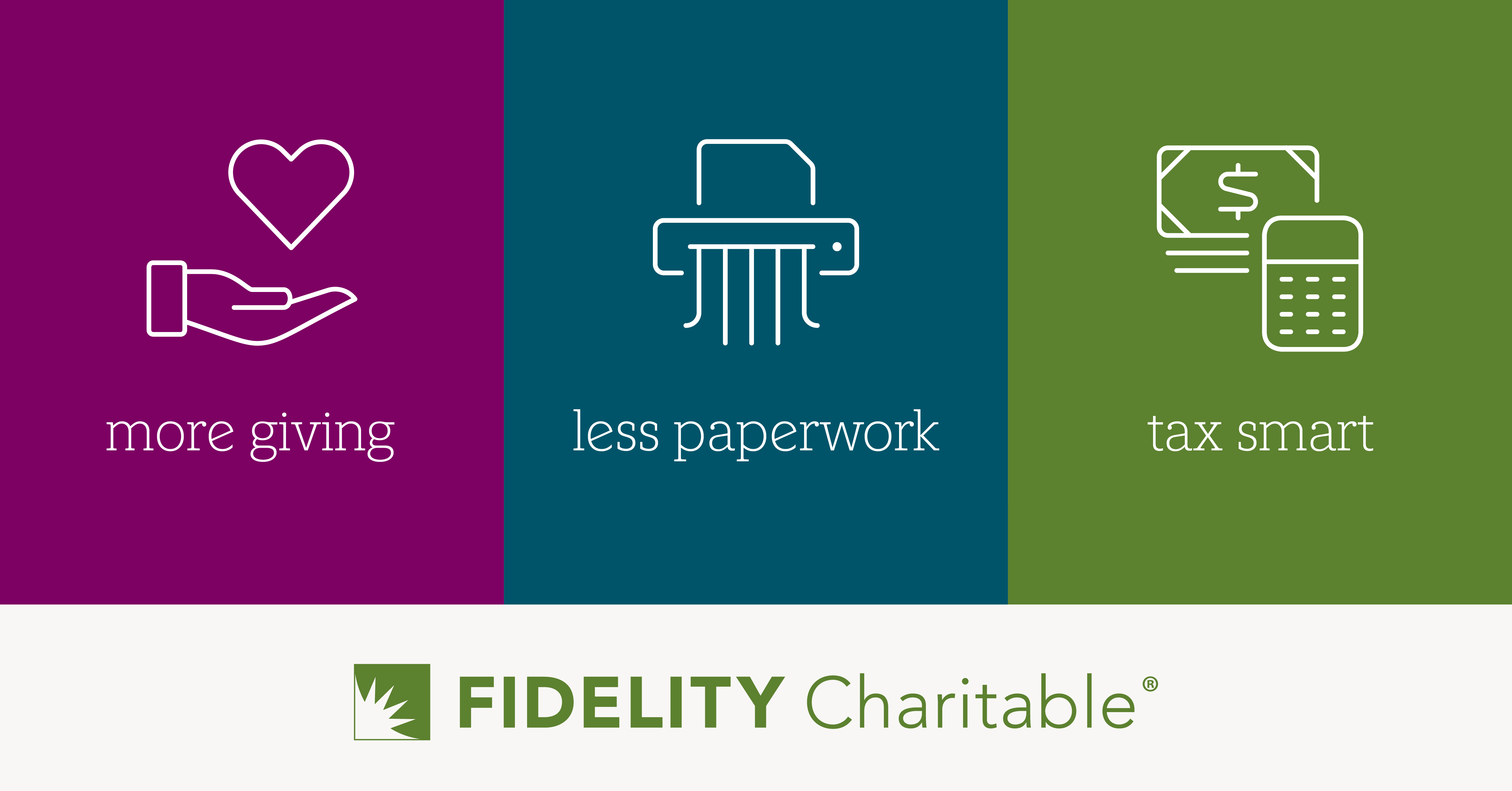Throughout history, from Rome to rock ‘n roll – uniquely positioned individuals and organizations have wielded influence over the masses. Through public education (or miseducation) – influential parties have guided decisions around health, economics, politics, and consumer choice.
Over the past decade, so-called “influencer marketing” has capitalized on the power of some to influence the purchasing behavior of many. In 2019, companies spent more than $6.6 billion advertising in this channel, with spending estimated to rise towards $15 billion in the next two years.
Now in 2020, at a moment when so much feels uncertain — including the state of American democracy itself – celebrities and brands are stepping up to use their influence not only to sell things but to provide information, encourage voting, and engage citizens in the civic process of democracy.
And this particular use of influence feels timely and more important than ever.
The State of American Democracy
Over the past fifty years, increasing numbers of Americans have disengaged from the political process. Whether electing local council people, judges, police chiefs or school superintendents, state or federal congressmen and women, senators, or even the President, voter turnout has been on the decline. In the 2016 presidential election, only 56% of eligible voters cast a ballot, according to Pew Research Center — a far lower percentage than in most developed countries.
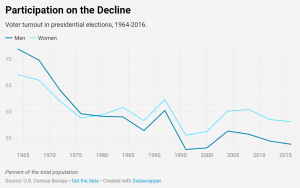
Voter participation in presidential elections has declined significantly in recent decades.
Efforts to make Election Day a federal holiday have failed, as have suggestions to hold the vote on a weekend as is the case in many other developed nations. In addition, less than half of US states currently require employers to give workers time off to vote in elections, according to Workplace Fairness.
In recent years, gerrymandering and redistricting have accelerated, along with other voter suppression tactics, especially those targeting minority communities. Between 2016 and 2018, 17 million Americans — or 8% of the electorate — have been removed from the voting rolls, according to the Brennan Center for Justice, most occurring in traditionally underrepresented districts.
Add to this recent questioning from POTUS about the legitimacy of absentee voting, then combine it with major funding cuts to the US Postal Service, and the urgent need for democratic advocacy and influence is apparent. What’s especially relevant is the fact that 42% of total ballots in 2016 were cast before Election Day. Now, given the current global health pandemic, Michael Traugott, a research professor emeritus at the University of Michigan’s Center for Political Studies, anticipate 60% or more of all voters will vote before Election Day, with a significant amount of vote-by mail. This leaves states scrambling to secure mail-in options despite being underfunded, under-resourced, and under attack!
All this has led Democratic Senator Ron Wyden of Oregon to warn that “the country could be headed for an electoral Chernobyl”, a theory supported by a recent Politico article entitled “8 Big Reasons Election Day 2020 Could Be a Disaster”.
So, you see? The need for strong education, access, and encouragement to get out (and safely secure) the vote is truly more essential than ever.
Organization and Collaboration
“No American should have to choose between earning a paycheck and voting.” – Dan Schulman, President and CEO, PayPal
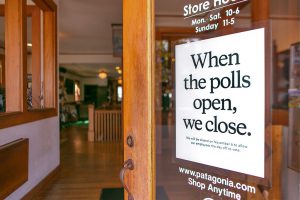
Patagonia closes its stores on Election Day to encourage voter participation.
Ahead of the 2018 elections, PayPal joined Patagonia and Levi Strauss & Co. in forming Time to Vote – a coalition of business leaders who want “to contribute to the culture shift needed to increase voter participation in our country’s elections”. As of today, more than 700 companies have signed on.
Many other nonpartisan organizations are tackling similar work, among them:
- A Day for Democracy – a CEO-founded initiative that encourages “leaders across the US to pledge to increase voter registration and participation of their employees.”
- ElectionDay.org – seeking to add to “the growing list of business leaders working to strengthen American democracy.”
- Actress and entrepreneur Rosario Dawson’s Voto Latino – focused on “educating and empowering a new generation of Latinx voters, as well as creating a more robust and inclusive democracy.”
Businesses Step Up
“This is an opportunity for companies to leverage their influence to build a better world for all— including themselves.” — Lily Zheng, D&I expert in a recent HBR article about new rules of CSR and corporate social justice
As part of their commitment to these various nonprofit partnerships, businesses from coast to coast are rising to meet consumer and employee expectations that call for brands to more deeply engage in the major cultural and political issues of the day. Even despite growing partisanship and division in the country which could jeopardize sales or alienate select customer groups, organizations are taking aggressive action to put their money where their mouth is.
Here are a few of the key actions that can move the needle on voter participation in November, and the companies undertaking them:
TIME OFF
- General Motors, Ford, and FiatChrysler have given employees the day off to vote since 1999, thanks to contract negotiations by the United Auto Workers union.
- Patagonia has given its workers the day off since 2016.
- Now, Coca-Cola, Twitter, Cisco, Uber, Steve Madden, Ralph Lauren, Birkenstock, and others have committed to the same.
- “We are certainly not doing it to make a political statement or a social statement.” — David Kahan, CEO, Birkenstock Americas
- And while it’s not the full day, Walmart, Apple, Coca-Cola, JP Morgan Chase, Starbucks, and Nike, among major law firms like Orrick, and dozens of others, have pledged flexible schedules and/or paid time off to vote.
EMPLOYEE RESOURCES
- Old Navy, owned by Gap, is taking a different approach, aiming to “ensure polling sites stay open and operate efficiently across the country” by offering 8-hours of pay to any of their 50,000 field employees who serve as poll workers in the 2020 election.
- Starbucks launched ‘Fuel Democracy’, a portal for employees to register to vote, request their ballot, and “volunteer to help make this year’s election safe and accessible.”
- Footwear Distributors & Retailers of America, a major trade organization, launched an online education center as “a one-stop shop for footwear companies to get their employees educated and activated.” Visit shoevoter.info.
LOBBYING EFFORTS
- Business for America has secured signatures from more than 100 companies including Unilever, REI, MTV, and Warby Parker on a letter to Congress requesting additional federal funding for state and local governments to expand mail-in voting for all eligible voters and to extend early in-person voting.
- As part of its “Operation Vote Safe” initiative, BFA is also encouraging companies to donate supplies, equipment, and/or employee time to “help election officials run safe, secure, accessible elections in your community”.
COMMUNICATION & VOTER OUTREACH
- Ben & Jerry’s is showing how product and marketing innovation can be done – not only naming new flavors in honor of current social and political activity – but tying these messages to a growing body of educational resources available on their website.
- Levi’s, a founding partner of Time to Vote, targets America’s 70 million eligible young voters in a recently released PSA that encourages talking and writing about voting, as well as actually voting. As one of the young women in the video aptly states: “We can’t vote a world into existence we can’t first imagine”. Watch the brilliantly powerful PSA here!
Sports Get into the Game
In light of the Black Lives Matter movement and a growing awareness of significant and unresolved racial and class inequalities in America, it’s not only brands and corporations getting in on the democracy game; public sports figures, pro franchises, colleges, and even the commissions themselves are committing to help get out the vote.
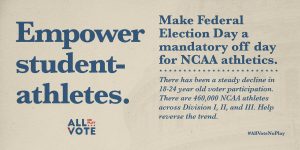
PROFESSIONAL
- Back in June, basketball superstar LeBron James announced the creation of More Than a Vote, a nonprofit aimed at combating voter suppression in the Black community. With over 136 million social media followers personally, LeBron’s influence is unparalleled given that only 137 million Americans voted in the 2016 presidential election!
- The NBA has committed to create a social justice coalition, work with election officials, and create advertising spots to promote “greater civic engagement in national and local elections.”
- On November 3rd, 2020, stadiums and arenas across the country will temporarily transition into Election Super Centers as a growing roster of teams across the MLB, NBA, NFL, and NHL step forward to “ensure that millions of Americans will be able to vote safely and securely, overcoming hurdles seen during state primaries.”
COLLEGE
- The NCAA announced in August, it “encourages” all 1100 member schools to give athletes election day off from sports commitments.
- #AllVoteNoPlay is a rapidly-growing Twitter movement started by an assistant coach at Georgia Tech that encourages college-level coaches to “help players register and decide a voting plan.”
- In a recent meeting of college football’s Southeast Conference, coaches and staff were encouraged to talk to their teams “about the electoral college, the electoral map and how elections are decided at the local, state and federal level.” As Greg Sankey, SEC Commissioner described it: “Non-partisan. We want people to make their own decisions about voting. But part of our responsibility is to educate. That’s probably the first time our football coaches’ meeting has included a discussion of the electoral college.”
Influencing Engagement and Turnout
In conclusion, celebrities and brands have always had influence.
In 2020, they also have responsibility to a broader cross-section of stakeholders, as well as a vested interest to use their power and influence to support American democracy.
I love the action that is happening and hope it adds up to success in November for all of us Americans.
